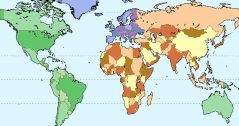|
|
| COMPANIES |
Discover the reality of companies and brands!
|
| TRANSNATIONALE.ORG |
| Free and independant information on large corporations |
Home >South KoreaEconomy, tax incentives & labor conditionsEmployers used Article 314 of the Criminal Code, barring "Obstruction of Business" to systematically harass and seek the incarceration of union leaders, and to try and bankrupt unions. Despite the abusive and discriminatory way in which Article 314 was used against workers, the government did nothing to intervene or clarify the law – preferring to remain complicit in the anti-union actions perpetrated under this criminal code. The charge of "Obstruction of Business" was indiscriminately used by vengeful employers against union leaders who were seeking to collectively bargain, hold meetings, conduct strikes and pickets, and other basic, fundamental union activities. Employers also commonly used the government’s prosecution of workers under this law to justify further company disciplinary measures, including termination. Article 314 carries heavy penalties under law – a worker found guilty faces up to five years imprisonment or a fine of up to 16,000 USD.
The law on Special Economic Zones (SEZs) of July 2003 contains preferential provisions in relation to foreign companies investing in the SEZs. It exempts them from many national regulations on the protection of the environment and labour standards. It is feared that this will result in further violations of workers' rights. The trade unions have objected particularly to the fact that the new law makes it easy to hire "irregular" workers, who will have little or no protection.
Three special economic zones in Busan-Jinhae, Incheon and Gwangyang. Income and corporate tax exemption during 7 years.
Main violations of the human rights and dirty money laundering
2004 Novartis AG |
translate this page in arabic chinese dutch german japanese korean russian
Legal notice © T&C 1999-2010
| CONTRIBUTIONS |

